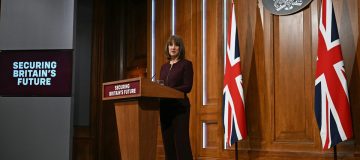Rachel Reeves has been warned to take “care” with a possible pension tax raid.
City platform Hargreaves Lansdown has warned Rachel Reeves that “tinkering” with the pension tax relief could cost the UK in the long run and undermine the government’s fresh attempts to get workers to save more into retirement.
The return of the Pensions Commission, which will report its findings on the adequacy of retirement savings in 2027, will likely see several policies recommended to the government to boost workers’ savings as they approach retirement.
But Hargreaves Lansdown has warned that expected tax rises in this year’s Autumn Budget could thwart plans to boost pension contributions if the lump sum threshold is reduced or rates are changed.
Its head of retirement Helen Morrissey said the commission will have a “tricky” job in trying to get people to boost pension contributions but warned that hiking taxes could dissuade people from putting enough cash in pension pots.
“As we run into the Budget any discussion around reform of pension tax relief needs to be treated with care,” Morrissey said.
“Tinkering with these incentives could lead to people putting less away for their future which could cost the state more in the long run.
“Stability in pensions tax is essential if people are going to be confident that the money they put away today will be there for them decades into the future.”
The Fabian Society, a left-wing think tank, said last year the government should create a flat rate of tax relief for individual and employer pension contributions for all tax bands or reduce the tax-free lump sum, which can currently be in excess of £250,000.
Labour ministers ruled out scrapping the higher 40 per cent rate tax relief on pension contributions before the last Budget but it has so far refused to comment on suggestions pensions could be targeted.
The Department for Work and Pensions (DWP) said some 45 per cent of workers were not putting any cash into their pensions, with an estimated 15m people not saving enough for retirement.
The new commission is expected to look more closely at small savings trends across low-income workers in the private sector, the self-employed and people from Pakistani and Bangladeshi backgrounds.
Its last version in 2006, which recommended auto-enrolment in workplace pensions, led to a rise in the number of eligible employee savings from 55 per cent in 2012 to 88 per cent now.
Morrissey said members of the commission will have to consider how far earnings should be used for the “here and now” versus for the future to prevent retirees from receiving a “nasty shock” that hits their lifestyles.
Story Continues
“State pension and minimum auto-enrolment contributions should be set at a level that helps lower earners hit their target replacement rate and higher earners would be encouraged to contribute over and above these minimums to hit theirs.”
Several City firms, including Fidelity International, have urged the commission to provide certainty on taxation as part of its efforts to encourage sensible saving.
“We encourage the government to take a holistic view, including pensions taxation in its considerations, to help shape a sustainable and effective policy framework for the future and avoid the constant speculation about pension taxation changes which risk causing real harm to consumers,” said James Carter, head of platform policy at Fidelity.

